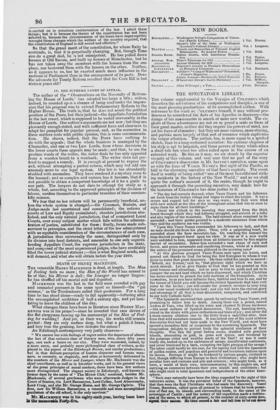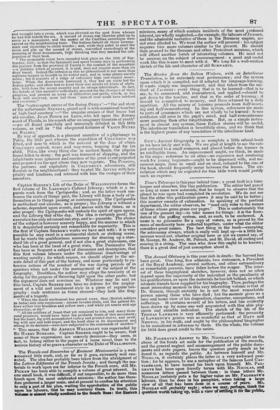THE SPECTATOR'S LIBRARY.
THE volume supplemental to the Voyages of COLUMBUS which describes the adventures of his companions and disciples, is one of the most pleasing productions of its accomplished author. With reference to the work on clorimmus himself, it may without pro- faneness be considered the Acts of his Apostles in discovery—the doings of his missionaries in search of more new worlds. The ex- ploits of these adventurers are not on so grand a scale as those of their great master, neither did they require his powers of mind, nor yet his force of character; but they are more various, more stirring, and partake more largely of that sort of romance which captivates the vulgar attention. The author, too, is more equal to a spirited sketch, than to a long-sustained narrative: the extreme elegance of his style is apt to languish, and those powers of fancy which adorn a short tale tire when too often called upon in the course of an extended work. Be this as it may, we are struck by the superior vivacity of this volume, and very sure that no part of the story of CoLumnus's discoveries in Mr. lavixo's narrative, came upon us with the force of VASCO NUNEZ'S first sight of the Pacific, as told in the charming narrative of that hero's exploits. The event itself is worthy of being called " one of the most beautiful and strik- ing incidents in the history of the New World ;" and as we shall quote the author's account of it, the reader, though he ought to approach it through the preceding narrative, may decide how far the historian of COLUMBUS has done justice to it.
" The day had scarcely dawned, when Vasco Nunez and his followers set forth from the Indian village and began to climb the height. It was a severe and rugged toil for men so way-worn ; but they were filled with new ardour at the idea of the triumphant scene that was so soon to repay them for all their hardships." About ten o'clock in the morning they emerged from the thick forest through which they had hitherto struggled, and arrived at a lofty and airy region of the mountain. The bald summit alone remained to be ascended ; and their guides pointed to a moderate eminence from which they said the southern sea was visible. " Upon this Vasco Nunez commanded his followers to halt, and that no man should stir from his place. Then, with a palpitating heart, he ascended alone the bare mountain-top. On reaching the summit the long-desired prospect burst upon his view. It was as if a new world were unfolded to him, separated from all hitherto known by this mighty barrier of mountains. Below him extended a vast chaos of rock and forest, and green savannahs and wandering streams, while at a distance the waters of the promised ocean glittered in the morning sun? " At this glorious prospect Vasco Nunez sank upon his knees, and poured out thanks to God for being the first European to whom it was given to make that great discovery. ..He then called his people to ascend: Behold, my friends,' said he, 'that glorious sight which we have so much desired. Let us give thanks to God that he has granted us this great honour and advantage. Let us pray to him to guide and aid us to conquer the sea and land which we have discovered, and which Christian has never entered to preach the holy doctrine of the Evangelists. As to yourselves, be as you have hitherto been, faithful and true to me, and by the favour of Christ you will become the richest Spaniards that have ever come to the Indies ; you will render the greatest services to your king that ever vassal rendered to his lord ; and you will have the eternal glory and advantage of all that is here discovered, conquered, and converted to our holy Catholic faith.'
" The Spaniards answered this speech by embracing Vasco Nunez, and promising to follow him to death. Among them was a priest, named Andres de Vara, who lifted up his voice and chanted Te Drum laudamus —the usual anthem of Spanish discoverers. The rest, kneeling down, joined in the strain with pious enthusiasm and tears of joy ;_ and never did a more sincere oblation rise to the Deity from a sanctified altar, than from that wild mountain summit. It was indeed one of the most sublime discoveries that had yet been made in the New World, and must have opened a boundless field of conjecture to the wondering Spaniards. The imagination delights to picture forth the splendid confusion of their thoughts. Was this the great Indian ocean, studded with precious islands, abounding in gold, in gems and spices, and bordered by the gorgeous cities and wealthy marts of the East ? or was it some lonely sea, locked up in the embraces of savage, uncultivated continents, and never traversed by a bark, excepting the light pirogue of the savage? The latter could hardly be the case, for the natives had told the Spaniards of golden realms, and populous and powerful and luxurious nations upon its shores. Perhaps it might be bordered by various people, civilized in fact, though differing from Europe in their civilization; who might have peculiar laws and customs and arts and sciences ; who might form, as it were, a world of their own, intercommuning by this mighty sea, and carrying on commerce between their own islands and continents ; but who might exist in total ignorance and independence of the other hemi- sphere. ` Such may naturally have been the ideas suggested by the sight of this unknown ocean. It was the prevalent belief of the Spaniards, however, that they were the first Christians who had made the discovery. Vasco Nunez, lierefore, called upon all present to witness that he took posses- sion of t at sea, its islands, and surrounding lands, in the name of the sovereigns of Castile ; and the notary of the expedition made a tedtilno- nialof the same, to which all present, to the number of sixty-seven men, Signed;their names, Ike then caused a fair and tall tine to Wed dOwn
and wrought into a cross, which was elevated on the spot from whence he had first beheld the sea. A mound of stones was likewise piled up to serve as a monument, and the mires of the Castilian sovereigns were carved on the neighbouring trees, The Indiansbeheld all these ceremo- nials and rejoicings in silent wonder ; and, while they aided to erect the cross and pile up the mound of stones, marvelled exceedingly at the meaning of these monuments, little thinking that they marked the sub. jugation of their land. The memorable event here recorded took place on the 26th of Sep- tember, 1513 ; so that the Spaniards had spent twenty days in performing the journey from the province of Careta to the summit of the mountain —a distance which atpresent, it is said, does not require more than six days' travel. Indeed the isthmus in this neighbourhood is not more than eighteen leagues in breadth in its widest part, and in some places merely seven ; but it consists of a ridge of extremely high and rugged moun- tains. When the discoverers traversed it, they had no route but the Indian paths ; and often had to force their way amidst all kinds of obsta- cles, both from the savage country and its savage inhabitants. In fact, the details of this narrative sufficiently account for the slowness of their progress, and present an array of difficulties and perils, which, as has been well observed, none but those ' men of iron' could have subdued and overcome."
The "extravagant career of the daring .0JEDA"—" the sad story of the unfortunate NIENESA, grand as it is with occasional touches of high-bred courtesy"—" the singular cruises of that brave but old cavalier, JUAN PONCE DE LEON, who fell upon the flowery coast of Florida, in his search after an imaginary fountain of youth" —are all found gracefully and amusingly detailed in this little volume, as well as " the chequered fortunes of VASCO NUNEZ DE BALBOA:.
By way of appendix, is a pleasant narrative of a pilgrimage to palos, the little port whence the expedition of COLUMBUS was fitted, and near to which is the convent at the door of which COLUMBUS arrived, weary and way-worn, begging focal for his child. Palos, like every thing else in modern Spain, the pilgrim found fallen to decay : the port was innocent of shipping, and the inhabitants were ignorant and careless of the great event projected and prepared on the spot where they now vegetate. The PINZONS, the partners and capitalists in COLUMBUS'S adventures, still flourish in the neighbourhood : they treated Mr. IRVING with hos- pitality and kindness, and retraced with him the vestiges of their ancestors.



























 Previous page
Previous page